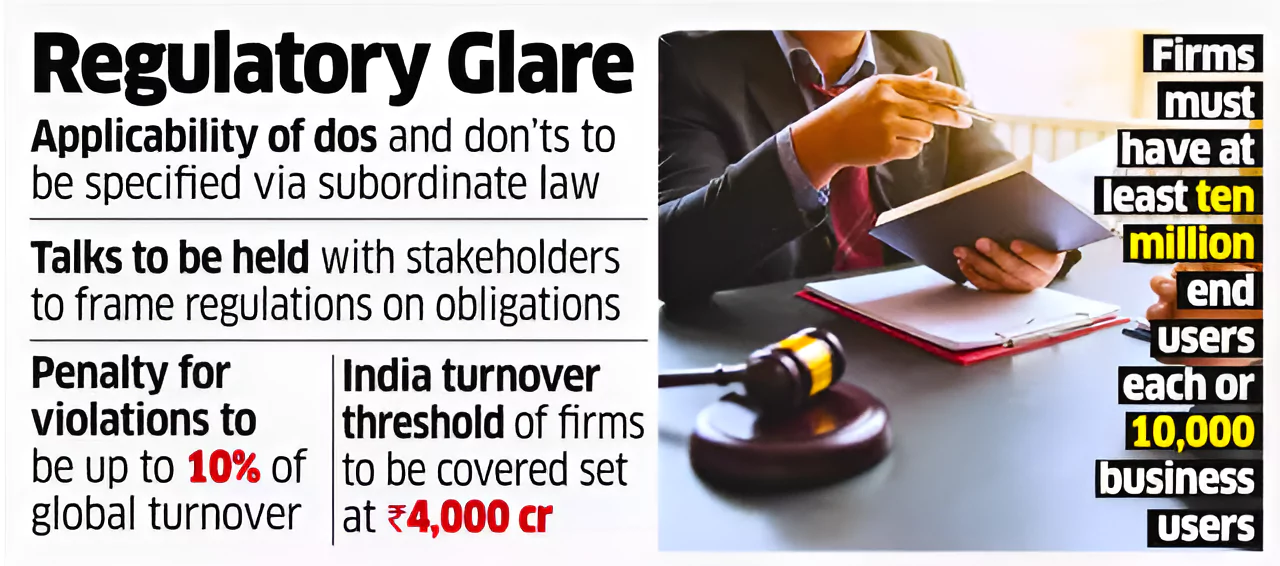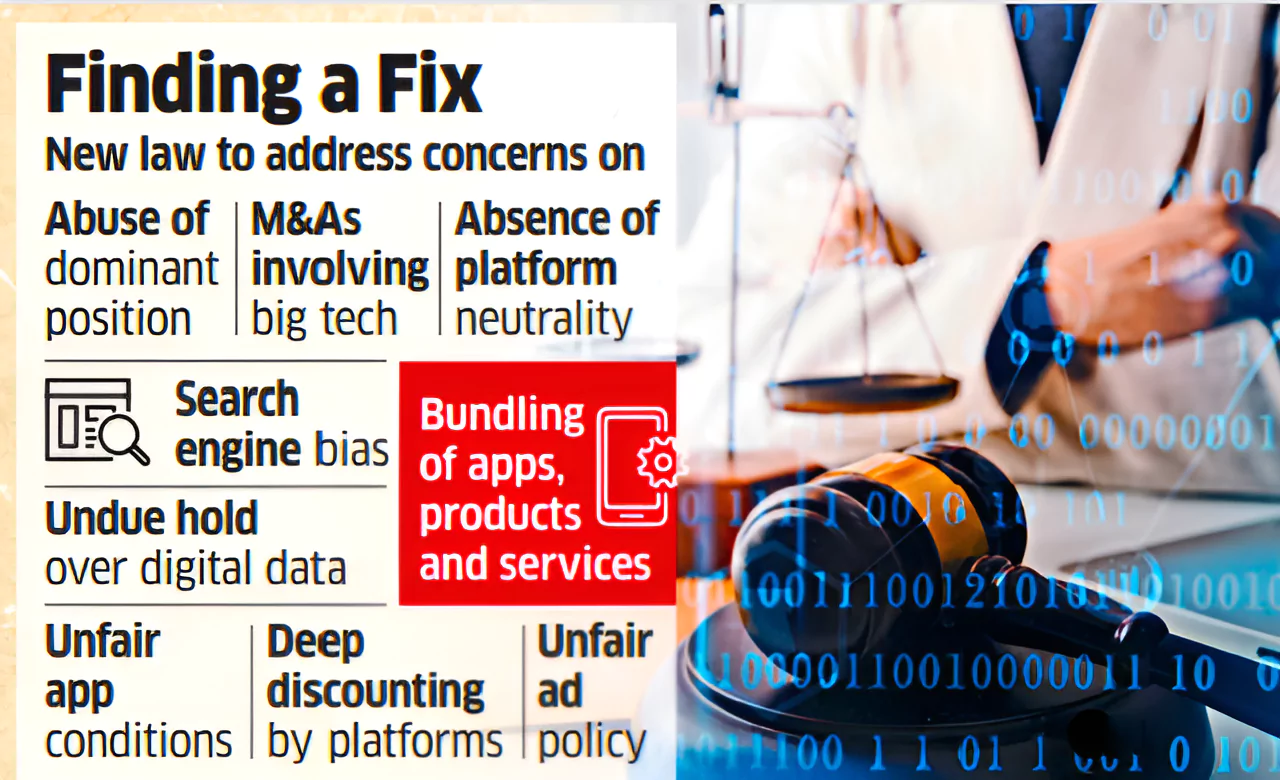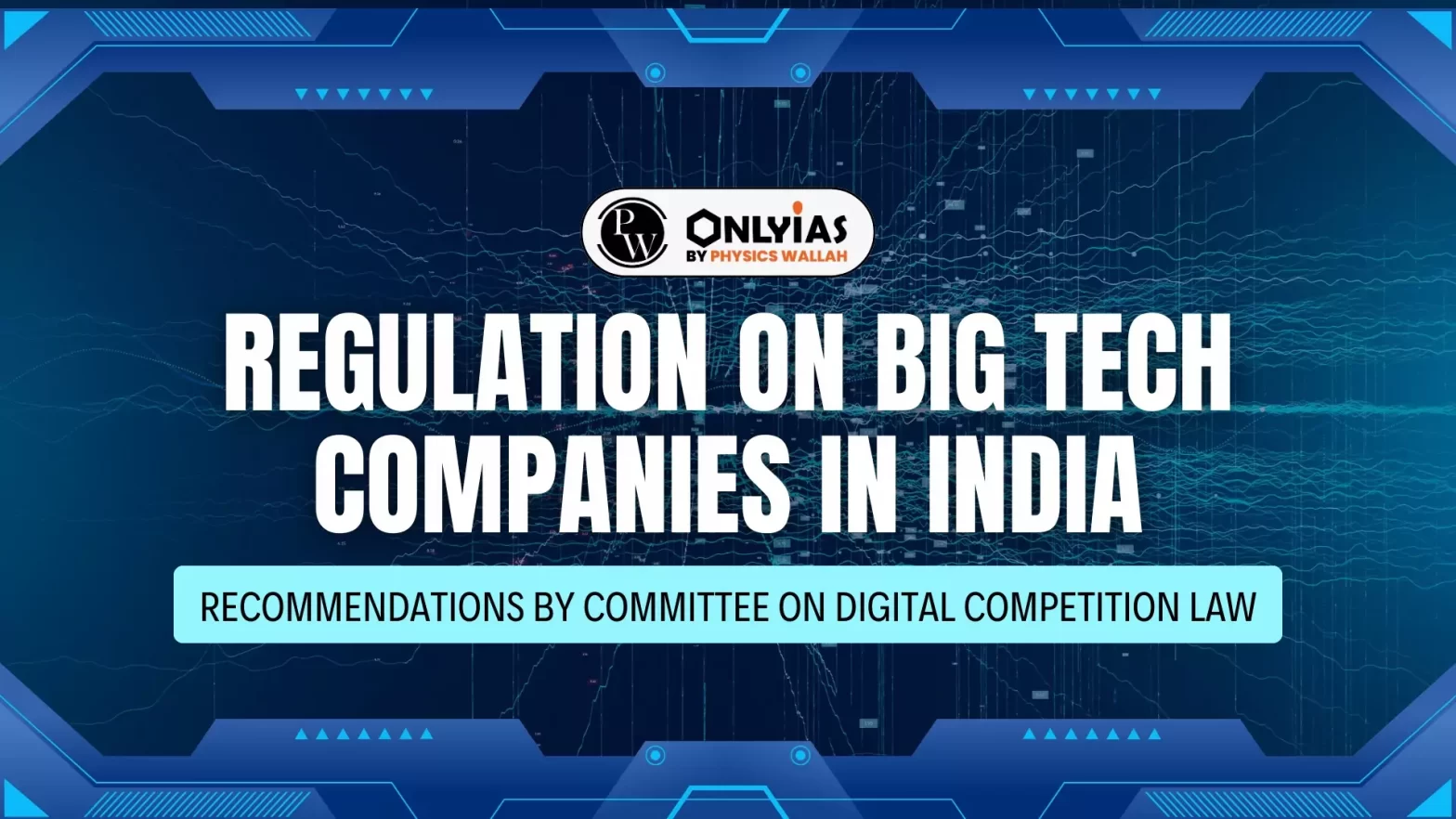Context
This Article is based on the news “Panel recommends law to regulate Big Tech firms” which was published in the Hindu. Recently, the Committee on Digital Competition Law (CDCL), formed by the Ministry of Corporate Affairs (MCA) last February, released its report, recommending legislation to regulate the market power of Big Tech firms like Google and Meta.
Committee on Digital Competition Law Submits Its Report
- It follows the report of the Parliamentary Standing Committee on Finance which proposed a separate digital competition law.
- The CDCL was tasked with examining whether India needed an ex-ante framework (where the conduct of Big Tech is sought to be regulated and specified practices are upfront declared illegal) or not.
- The MCA invited public comments on the expert committee report and the draft bill.
About Big Tech
- Big Tech, also known as the Tech Giants, are the most dominant companies in the information technology industry, majority of which are centered in the United States.
- For example Google, Meta, Amazon, etc.

Recommendations by the Committee on Digital Competition Law (CDCL)
-
Classification:
- The committee prepared a draft targeting firms with a “significant presence” in the market for a “Core Digital Service,” terming these “Systemically Significant Digital Enterprises,” or SSDEs.
-
A Twin Test:
- An enterprise is deemed an SSDE if it passes a twin test:
- The Significant Financial Strength Test: Based on India-specific turnover (Business), global turnover, global market capitalisation, and gross merchandise value.
- The Significant Spread Test: Based on presence in a Core Digital Service in India on the basis of the number of end-users and business users.
- Discretion of CCI: Even if the quantitative thresholds are not met, the CCI can designate an enterprise as an SSDE if it thinks that the company has a “significant presence” with respect to a core digital service (CDS) along multiple factors.
-
Associate Digital Enterprises (ADGs):
- In cases where enterprises providing Core Digital Services are part of a group, designation may not be limited to just one enterprise in the group, but group firms could be regulated as ADGs.
-
Regulations:
- Differential obligations upon different SSDEs and ADEs depending on factors such as their business models and size of their user base.
-
Self Declaration:
- The proposed Bill requires digital companies to notify the CCI that it fulfills the criteria to qualify as SSDE based on the criteria set in the Bill.
-
Key Criterion for Identification of SSDEs:
- Turnover in India of not less than Rs 4,000 crore
- Global turnover of not less than $30 billion
- Gross merchandise value in India of not less than Rs 16,000 crore
- Global market capitalisation of not less than $75 billion
- At least 10 million end users for its core digital service
- 10,000 business users for its core digital service
-
Obligations:
- SSDEs cannot directly or indirectly favour its own products, services, or lines of business, or those of related parties and also not use or rely on non-public data of business users operating on its core digital service.
- The designated SSDEs will also be prohibited from engaging in anti-competitive practices (ACPs) such as self-preferencing, anti-steering, and restricting third-party applications, among others, for the identified service.
- The CCI can impose different sets of regulations for different CDSs and obligations for different SSDEs.
- The SSDEs and ADEs should not engage in any behaviour (such as dividing up their business, etc.) that will allow them to escape the regulations.
- SSDEs are prohibited from using any non-public data of their business users or cross-using personal data of end users collected from different CDSs. They must also allow users to access third-party applications and change default settings.
-
Penalty:
- If a firm does not self-designate, the penalty would be derived from not the individual company’s domestic revenues, but from the entire corporate group’s global turnover.
- The penalty could be restricted to a maximum of 10% of the global turnover.
-
Exemptions:
- The Centre is proposed to be empowered to exempt enterprises from any provisions, rules, or regulations for three reasons:
- State Security or Public Interest
- India’s obligations under bilateral or global treaties
- If the enterprise performs a sovereign function on behalf of the central or state government
-
Significance:
- This will have a major impact on the big tech enterprises as they will now also be subject to a separate regulatory regime.
Significance of Big Tech Firms
- Economy: The impact of Big Tech is felt on a global level. They are continually looking to expand their reach, influencing the domestic economy of almost all countries.
- Society: Big Tech influences societal change by being accessible to the masses. The products of these companies are widely used and can impact the consumer choices.
- Politics: Big Tech have the reach and capability to create political opinion. These can be in the form of political ads on their platform and also promoting the opinion of certain political leaders on social media.
- National Security: Since Big Tech operates across the world, countries claim that these companies support rival economies, which ultimately affects national security.
- Example: Huawei was blamed by the US for spying on behalf of China.
- Technology: The Big Tech are well known for their innovation and technology development. They are the first to introduce ground-breaking technologies.

Why is There a Need for Regulation On Big Tech companies in India?
- Increasing Pace of Digitisation: The Competition Act of 2002 intervenes after the occurrence of an anti-competitive conduct and it was designed at a time when the extent and pace of digitalisation as is witnessed today could not be foreseen.
- India is currently adopting an ex-post framework where a regulator adjudicates whether certain acts of a player are illegal after they have been committed.
- Ex post actions always take place on information available, sufficient evidence is presented to demonstrate the negative externalities and costs with a market failure.
| The network effect is a business principle that illustrates the idea that when more people use a product or service, its value increases. |
- A Danger of Monopoly: Big Tech firms are able to rapidly increase their user base (owing to their ) and establish market power that is difficult for a new entrant in the industry to dislodge.As such, digital markets bear the risk of becoming irreversibly polarised in favour of the incumbent.
- Predatory Pricing and deep discounting: It entails the lowering of prices that forces other firms to be out competed.
- Amazon and Flipkart were accused of deep discounting and creating in-house brands to compete with local sellers.
- Need for New Legislation: To introduce an ex-ante legislation specifically applicable to large digital enterprises, to supplement the Competition Act.
- Self-Preference: A crucial aspect of self-preferencing beyond the search algorithms is the bundling of services, especially with pre-installed apps, where the manufacturers eliminate competition without the consumer’s consent.
- Example: Apple is facing heat in the U.S. and Europe over pre-installed apps.
- Privacy Violations: Big Tech firms have faced criticism for infringing on user privacy, leveraging personal data for commercial purposes, and concerns on monitoring of users’ online activities.
- Example: Facebook’s unauthorized data sharing with Cambridge Analytica, exposing user data to political manipulation.
- Tax Avoidance: Allegations of tax evasion have been leveled against Big Tech as they establish their businesses in low-tax jurisdictions to minimize their tax obligations.
- Example: Apple’s use of the “Double Irish with a Dutch Sandwich” tax avoidance scheme.
- Job Displacement: Many technological advancements endorsed by Big Tech, such as automation, have resulted in job losses, particularly in developing and underdeveloped countries.
- Disregard for Local Laws: Big Tech companies have been accused of disregarding domestic laws and claiming immunity based on their international origins.
- Dissemination of Misinformation: Platforms operated by Big Tech have been accused of amplifying misinformation, with implications for the rule of law and public order.
- Political Influence: The political biases of Big Tech become evident when they selectively promote specific political ideologies and thoughts.
What Are the Issues and Challenges Associated with regulating Big Tech Firms?
About Competition Commission of India:
- It is the competition regulator in India.
- It is a statutory body responsible for enforcing the Competition Act, 2002 and promoting competition throughout India.
|
Such ex-ante regulation could potentially stifle innovation by imposing burdensome regulations on tech companies.
Ex-ante Provisions:
- Under an ex-ante framework, the law will issue a set of proscriptions aimed at preventing anti-competitive behaviour by larger tech companies.
- The EU was the first major jurisdiction to introduce ex-ante provisions, under which the European Commission designates large digital platforms offering specific services as ‘gatekeepers’, which must adhere to a set of proscriptions.
|
-
- Unintended Consequences: This could lead to unintended consequences, such as reduced consumer choice and higher prices.
- Over-Regulations: The ex-ante regulation for the e-commerce sector may be untimely and excessive and may lead to over-regulation.
- Amazon said it is already heavily regulated by the foreign direct investment policy, which mandates that it can only act as an online marketplace and not as a seller.
- Unsuitable Approach: A one-size fits-all approach similar to the DMA model would be unsuitable for effective regulation of digital markets since it remains untested.
- Flipkart by mentioning the European Digital Markets Act said that this one-size fits-all approach is unsuitable.
How is India Regulating Big Tech firms?
-
Safe Harbour Clause:
- Currently, big tech companies in India are protected by the safe harbour of the Communications Decency Act (CDA) of the USA along with its Indian counterpart Section 79 of India’s Information Technology Act, 2000 (IT Act).
- Safe harbour, as prescribed under Section 79 of the IT Act, 2000 is legal immunity that online intermediaries enjoy against content posted by users on their platforms.
- However, now India is working on its own Digital India Act—a replacement of IT Act 2000 along with many others like Telecom bill, data localisation and others.
-
Competition Act, 2002:
- In India, antitrust issues are governed by the Competition Act, 2002, and the Competition Commission of India checks upon monopolistic practices.
-
Competition (Amendment) Bill, 2022:
-
- Regulation of Mergers and Acquisitions: Mergers and acquisitions with transaction value of more than Rs 2,000 crore will require CCI’s approval.
- Prohibition of anti-competitive Practices: The Bill expands the definition of anti-competitive practices to include self-preferencing and other practices that can harm consumers and businesses.
- New powers for the CCI: The Bill gives the CCI new powers to investigate and prosecute anti-competitive practices.
- Increased Transparency: The Bill requires Big Tech companies to provide more information to the CCI about their business practices.
Global Perspectives on Regulation of Big Tech Firms
- Europe:
- Digital Markets Act (DMA): The DMA will directly ban harmful business practices by very large digital players, create a fairer and more competitive economic space for new players and European businesses.
- Digital Services Act (DSA): This act targets categories of online services, from simple websites to internet infrastructure services and online platforms.
- USA: The US adopted Anti-trust legislation targeting the dominance of Big Tech companies by giving states greater power in competition cases and increasing money for federal regulators.
- Australia: Competition watchdog in Australia recommended tighter regulation of Facebook and Google, and moves to improve media competition.
- The Online Safety Act will have the power to force social media companies to delete posts that amount to online bullying, and to find the companies and those who hosted the alleged abuse.
Conclusion
In the world of global diplomacy and technological advancements countries need to recognize the new dynamic of bargaining power between State and Big Tech firms and these big tech firms need to build efficient and effective compliance processes, addressing regulation at scale while keeping costs under control and maintaining the ability to innovate at pace.
Also Read: European Union’s Digital Services Act
![]() 13 Mar 2024
13 Mar 2024


